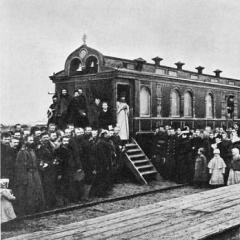Presentation of the concept of national security of the Russian Federation. Presentation "military threats to the national security of the Russian Federation" Presentation on modern threats to the security of the Russian Federation

National security of the Russian Federation – a state of protection of the individual, society and the state from internal and external threats, which allows to ensure a decent quality and standard of living for citizens, sovereignty, territorial integrity and sustainable development of the Russian Federation, defense and security of the country.
National Security Threat – direct or indirect possibility of causing damage to constitutional rights, freedoms, living standards, sovereignty, integrity, development of the Russian Federation, defense and security of the state.

Strategic national priorities
- Sustainable social and economic development of the country
- protection of state sovereignty
- independence
- territorial integrity

Basic directions state security
- National security
- State and public security

Main trends in the development of the world community
- Globalization of all spheres of international life
- Emergence of new challenges and threats
- Exacerbation of contradictions between states
- Increasing the number of states possessing nuclear technologies
(uneven development, different levels of well-being, struggle for access to energy)
- World financial crises (their consequences may become comparable to the large-scale use of military force.)

Main threats to Russia's military security
Policies of a number of leading foreign countries
Unilateral formation of global systems
- Superiority in military strength
- Development of nuclear forces
- militarization of near-Earth space
- Development of high-precision,
information means of warfare

In the modern world, in the field of ensuring the military security of Russia, national defense is a priority , strategic goals, which are:
1. Prevention of global and regional wars and conflicts;
2. Strategic deterrence:
-Development and implementation of various measures(political, diplomatic, military, economic) aimed at reducing threats from aggressor countries.
Carried out with the help of the economic capabilities of the state, the development of a system of military-patriotic education, and the military structure of the state
3. Basic principles of national defense: sufficiency and effectiveness(non-military response, diplomacy, peacekeeping, military cooperation)


Ways to achieve strategic goals of national defense
- Development of the national security system
- Development of a promising military-technical policy
- Development of military infrastructure
- Improving the management system of the country's military organization
- Increasing the prestige of military service

State policy in the field of national security and military development
is aimed at improving the RF Armed Forces, called up for any
Conditions to ensure the security and territorial integrity of Russia
“National Security” - Technological lead of the world's leading powers in the creation of new military equipment. Proliferation of nuclear and other weapons of mass destruction. Incompleteness of the military reform of the Russian Armed Forces. Information: Information technologies in all spheres of life. The intensity of human impact on the natural environment.
“Conscription for military service” - Educational institutions. Financially secure. Environment. Prosperous. Society. This situation could lead to a crisis in the conscription system. - Ideology and ideological work in society; - Operating conditions; - Social guarantees; - Information. State. Problems of the modern Russian army.
"Military ranks" - Army General. Sergeant. ? Captain 2nd rank. Verification work. Chief ship's foreman. Ensign. Major. Colonel. Lieutenant. Vice Admiral. Admiral. Lieutenant colonel. Midshipman. Military ranks of the Russian armed forces. Lance Sergeant. Private. Colonel General. Captain-lieutenant. Lieutenant General.
“Military registration in an organization” - Military registration in organizations is divided into: Special military registration (Reservation of citizens in reserve). Other events. General military registration. Advisory Group "Voenkom" (consulting and audit of military registration of citizens in organizations). Military registration of citizens in organizations. Military duty.
“Rights and responsibilities of military personnel” - The right to participate in the management of the affairs of society and the state. Right to housing. Service time and the right to rest. The right to freedom of movement and choice of place of residence. Legal status of a military man (status). Protection of honor and dignity. The right to health protection and medical care. Freedom of speech.
"Military Uniform" - Order of Courage. Order for labor in agriculture. Nesterov Medal. Even the modern look of uniforms bears the imprint of ancient traditions. Pushkin Medal. The concept of insignia of the order was formed, which included a cross and a star. In the Middle Ages there was no form as such. Military uniform and orders of the Russian Federation.
There are a total of 36 presentations in the topic
The presentation “The main threats to the national interests and security of Russia. Formation of the modern level of culture of the population in the field of life safety” will help conduct a lesson with students on this topic, as well as test and consolidate the knowledge gained.
Download:
Preview:
To use presentation previews, create a Google account and log in to it: https://accounts.google.com
Slide captions:
The main threats to Russia's national interests and security. Formation of a modern level of population culture in the field of life safety
Study questions: The main threats to the national interests and security of Russia. Formation of a modern level of population culture in the field of life safety.
The main threats to Russia's national interests and security. Conceptual provisions in the field of ensuring national security are based on the fundamental relationship and interdependence of the National Security Strategy of the Russian Federation until 2020 and the Concept of long-term socio-economic development of the Russian Federation for the period until 2020.
The main threats to Russia's national interests and security. Today there are three types of threats to the national security of the Russian Federation: external, internal and cross-border.
The main threats to Russia's national interests and security. External threats include: deployment of groups of armed forces and assets near the borders of the Russian Federation and its allies; territorial claims against the Russian Federation, threats of secession of certain territories from the Russian Federation; interference in the internal affairs of the Russian Federation by foreign states;
The main threats to Russia's national interests and security. External threats include: a build-up of troop groups, leading to a disruption of the existing balance of power near the borders of the Russian Federation; armed provocations, including attacks on Russian military facilities located on the territory of foreign states, as well as on facilities and structures on the State Border of the Russian Federation and the borders of its allies; actions that impede Russia's access to strategically important transport communications; discrimination, non-compliance with the rights, freedoms and legitimate interests of citizens of the Russian Federation in some foreign countries.
The main threats to Russia's national interests and security. Experts include internal threats as follows: attempts to forcibly change the constitutional system and violate the territorial integrity of Russia; planning, preparation and implementation of actions to disrupt and disorganize the functioning of public authorities and management, attacks on state, economic and military facilities, life support facilities and information infrastructure; creation, equipment, training and activities of illegal armed groups;
The main threats to Russia's national interests and security. Experts include the following internal threats: illegal distribution of weapons, ammunition and explosives on the territory of the Russian Federation; large-scale organized crime activities threatening political stability in some regions of the Russian Federation; activities of separatist and radical religious national movements.
The main threats to Russia's national interests and security. Cross-border threats are manifested in the following: the creation, equipping and training of armed formations and groups on the territory of other states for the purpose of transferring them to operate on Russian territory; activities of subversive separatist, national or religious extremist groups supported from abroad, aimed at undermining the constitutional order of Russia, creating a threat to its territorial integrity and the security of its citizens; cross-border crime, including smuggling and other illegal activities on an alarming scale;
The main threats to Russia's national interests and security. Cross-border threats are manifested in the following: conducting information activities hostile to the Russian Federation; drug trafficking activities that create a threat of drug penetration into Russian territory or the use of its territory for the transit of drugs to other countries; activities of international terrorist organizations.
Formation of a modern level of population culture in the field of life safety. A person’s general culture in the field of life safety can be characterized as his ability to promptly and adequately respond to various dangerous and emergency situations of a natural, man-made and social nature, find the safest way out of the current situation, and reduce the risk factor for himself and for others.
Formation of a modern level of population culture in the field of life safety. The general culture in the field of life safety presupposes that a person: ● knows and follows the norms of a healthy lifestyle; ● owns health-saving technologies; ● is responsible for preserving the environment; ● knows the basic laws and regulations well and consciously fulfills their requirements in everyday life
Formation of a modern level of population culture in the field of life safety. In order to ensure personal, public and state security, each person must possess a number of personal qualities and constantly improve them: ● be inquisitive and learn to anticipate dangerous situations; ● be able to objectively assess your capabilities, mentally play out options for your behavior, strive to find the safest way out; ● develop responsibility
Questions and tasks: 1. Why is it necessary to constantly improve the level of training of the country's population in the field of life safety? 2. Which regulatory document of the Russian Federation sets out the main directions for ensuring the national security of Russia? 3. What personal qualities, beliefs and habits of a person contribute to the formation of a modern level of life safety culture?
Homework: Prepare for independent work: Countries and organizations in the modern world with which Russia successfully cooperates. National interests of Russia in the modern world. The main threats to Russia's national interests and security. Formation of a modern level of population culture in the field of life safety.
To use presentation previews, create a Google account and log in to it: https://accounts.google.com
Slide captions:
"Threats to Russia's national security and national defense"
National security Respect for the constitutional rights and freedoms of citizens. The state of security of the individual, society and state from internal and external threats. Preservation of the territorial integrity and sovereignty of the state, as well as civil peace and social stability in society. Sustainable development of the country. Ensuring the defense and security of the state.
National Security Structure
State security State security is a component of national security. Characterizes the level of protection of the state from external and internal threats. Ensuring state security includes a complex of political, economic, social, military and legal measures…. Bodies ensuring state security - special services, army and law enforcement organizations
Public security Public security is a component of national security. It characterizes the level of protection of the individual, society and the state primarily from internal threats of a generally dangerous nature. Law enforcement agencies and intelligence agencies ensure public safety
Economic security Economic security is a component of national security. Ensuring economic security in particular for the Russian Federation presupposes a state of the economy that maintains a sufficient level of social, political and defense existence and innovative development, invulnerability and independence of its economic interests in relation to possible external and internal threats and influences
Information security Information security is a component of national security. Characterizes the state of safety of the state’s information resources and the protection of the legal rights of the individual and society in the information sphere. Bodies ensuring information security of the Russian Federation: FSB of Russia
Energy security Political Economic Technogenic Associated with the energy independence of the state, its subject or region Includes tariffs and energy reserves that allow solving the assigned tasks Implies the technogenic nature of risks to humans, property and the environment associated with the operation of any energy installations Energy security is a component of national security
Technogenic safety Technogenic safety is a component of national security. Characterizes the degree of protection of the population, technical systems and the environment from man-made accidents and disasters that cause the occurrence of man-made emergencies. Bodies ensuring technogenic safety: Ministry of Emergency Situations
Environmental safety Environmental safety is a component of national security. Characterizes the level of negative impact of natural and anthropogenic environmental hazards on the environment and humans.
Threats to national security The policies of a number of leading countries aimed at superiority in the military sphere Creation of strategic non-nuclear weapons, including high-precision and high-tech means of warfare Unilateral formation of a global missile defense system Illegal actions in the cyber and biological fields, in the field of high technology Uncontrolled and illegal migration, drug trafficking and human trafficking Potential spread of epidemics Increasing shortage of fresh water
Global Missile Defense System Ground-Based Midcourse Defense Aegis Ballistic Missile Defense System Terminal High-Altitude Area Defense PAC-3 "Patriot"
Fresh water shortage Causes of fresh water shortage: Urban growth Creation of large industrial centers Pollution of water bodies with household and industrial waste Reduction of water flow in rivers due to human actions Excessive consumption and pollution of groundwater
Threats to the national security of Russia The state of the domestic economy Imperfection of the system of organization of state power and civil society Socio-political polarization of Russian society and the criminalization of public relations The growth of organized crime and the increase in the scale of terrorism The intensification of interethnic relations and the complication of international relations
Ensuring the national security of the Russian Federation Timely forecasting and identification of external and internal threats to the national security of the Russian Federation; Implementation of operational and long-term measures to prevent and neutralize internal and external threats; Ensuring the sovereignty and territorial integrity of the Russian Federation, the security of its border space; The rise of the country's economy, the implementation of an independent and socially oriented economic course; Overcoming the scientific, technical and technological dependence of the Russian Federation on external sources; Ensuring personal security of a person and a citizen, his constitutional rights and freedoms on the territory of Russia; Improving the system of state power of the Russian Federation; Ensuring strict compliance with the legislation of the Russian Federation by all citizens; Ensuring equal and mutually beneficial cooperation between Russia, primarily with the leading countries of the world;
Raising and maintaining the military potential of the state at a sufficiently high level; Strengthening the regime of non-proliferation of weapons of mass destruction and their means of delivery; Taking effective measures to identify, prevent and suppress intelligence and subversive activities of foreign states directed against the Russian Federation; Radical improvement of the environmental situation in the country. Ensuring national security and protecting Russia's interests in the economic sphere are priority directions of state policy. The most important tasks in foreign economic activity are: Creating favorable conditions for the international integration of the Russian economy; Expanding markets for Russian products;
Formation of a single economic space with member states of the Commonwealth of Independent States. Strengthen the protection of the interests of domestic producers. The implementation of a balanced credit and financial policy is of utmost importance; It is necessary to strengthen the role of the state in regulating the activities of foreign banking, insurance and investment companies, to introduce certain and justified restrictions on the transfer to foreign companies of deposits of strategic natural resources, telecommunications, transport and distribution networks. Taking effective measures in the field of currency regulation and control in order to create conditions for stopping settlements in foreign currency in the domestic market and preventing the uncontrolled export of capital.



